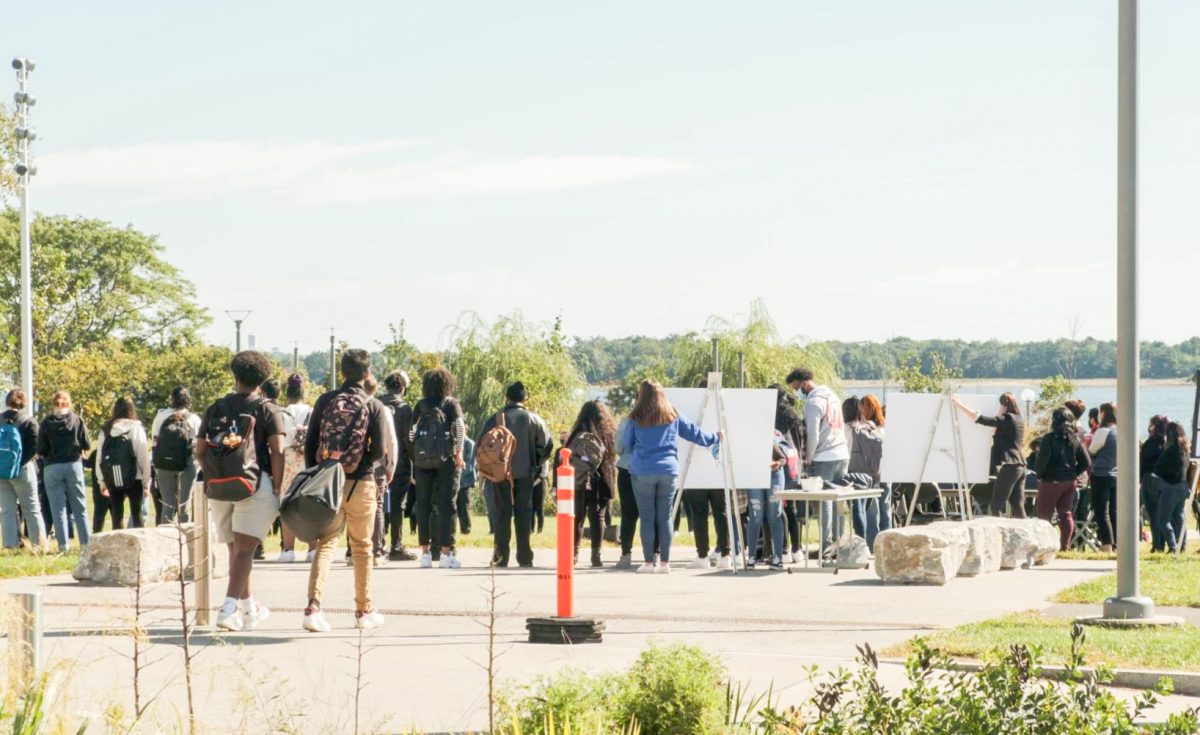The Campus Center and Event Services office revised the university’s space use policy last month, increasing restrictions for on-campus protests and demonstrations.
Kathleen Kirleis, the vice chancellor of administration and finance, announced the changes in an email that also highlighted new outdoor areas on campus.
“We must always respect the right to learn and the university operations that very right requires. To that end, we have updated the protest and demonstration section of our space use policy,” she wrote, adding that freedom of expression is “vital to our shared goal of the pursuit of knowledge.”
The updated policy designates four areas of the campus — each with an occupancy limit — where protests are allowed, and requires that organizers notify the university of planned demonstrations at least five days in advance. It does allow “marches, parades and processions” to be conducted on roadways and sidewalks with the same five-day notice, but other areas of campus are off-limits.
The new policy also prohibits indoor protests, except for Campus Center’s first floor terrace. Under the previous policy, which was last updated in 2017, indoor protests were prohibited only “if they cause disruption of or interference with instructional activities and other University business and campus events.”
Organizers must use a new “Protest and Demonstration Advance Notification Form” to inform administrators of their intentions. The form further explains the new process and compliance expectations, stating, “Campus community members who violate this policy may be subject to administrative disciplinary action. Organizers and participants not employed or enrolled with the University may be subject to relocation or removal from campus.”
DeWayne Lehman, the director of communications, said the policy was revised to reflect recent changes to the campus, including the completion of the quad. “The quad is designed for multiple purposes, and a number of areas have specifically designated uses, including event spaces, which will be listed among the available spaces that can be reserved for student activities and events,” he wrote in an email. The quad is not among the designated public assembly locations, according to the policy.
Compared to the 2017 policy, the new policy also further limits impromptu protests. Only demonstrations concerning events that have occurred within the past 24 hours are exempt, whereas the 2017 policy specifies that a protest’s lack of notice was not grounds for its termination.
In a new section titled “Prohibited Items,” the 2024 policy bans tents, combustible materials and non-service animals from protests. Additionally, the updated policy prohibits demonstrators from wearing “attire that attempts to disguises or conceal the identity of the wearer that the institution may be deem as obstructing the enforcement of these rules or the law.” As in the 2017 policy, protestors are required to produce university or government ID if requested by a university official.
Other changes include a restriction on noise level to 70 decibels from 7 a.m. to 11 p.m., an acknowledgement that organizers may be directed to delay their demonstrations for safety or logistical concerns and a statement of organizers’ liability for costs associated with securing the event.
The change follows similar policy updates from universities across the country, including Emerson College and University of Massachusetts Amherst. Emerson, UMass Amherst and UMass Boston, among others, have also adopted institutional neutrality policies distancing administrations from protestors’ views. UMass Boston’s reads, “Individuals exercising protest or demonstration at UMass Boston should not represent their views as official university positions.”
Amanda Achin, the secretary for the Classified Staff Union, said that the new policy demonstrates ongoing attempts to restrict union rights — restrictions that, she said, have affected most of the unions on campus in recent months. She described administrators as “very resistant” to unions’ practice of expanded bargaining, which allows any union member — not just members of the bargaining team — to silently observe sessions in an effort to increase transparency and accessibility of the bargaining process.
“The announcement of the updated protest policy is just another attempt by the administration to intimidate and restrict organizing on campus. We are a public university — we should have every right to assemble on campus without having to notify the administration or give them the details of our plans,” she said.
Lehman said the policy “reflects the balance required to ensure a learning environment for our students, while also ensuring time and place for free expression.”
“We believe the updated policy furthers the university’s objective to serve as a forum for ideas, and as an academic home for our students, faculty, and staff,” he wrote.
Max Herschman, the Jewish liaison for the UMass Boston chapter of Students for Justice in Palestine, also believes that the new policy is designed to silence protest groups on campus. “I think it’s a pretty clear sign we have power. If we didn’t have power, then this and other administrations wouldn’t be taking these actions,” he said. Herschman is a member of the chapter’s executive board.
Said Herschman, “We’re going to stand up and show them we’re not going to stop fighting for what’s right.
Update: Lehman wrote in an email Monday that the university will add the open areas of the quad to the list of available spaces later this year. “The ‘Quad Lawn,’ nearest the plaza entry of the Campus Center, and the ‘Lower Lawn,’ by the Quinn Administration Building, will be available for a variety of uses and community events,” he wrote. “The contractor is currently completing final work to ensure the landscaping and vegetation are sufficiently established for active use.
Correction: A previous version of this article incorrectly stated that the new policy prohibits indoor protests. It should state: The new policy prohibits indoor protests, except for Campus Center’s first floor terrace.



